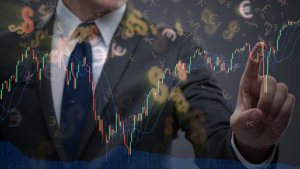“How long does it take to learn how to trade on Forex?”… There are many different variables to answer this question, which really boils down to the circumstances of each individual. But, there are different ways of understanding the subject that can help you pass the learning curve much faster. Unfortunately, some people never really learn to trade, but others do it very well and more when you understand that you never stop learning. What we want is that you can learn to trade Forex as quickly as possible but with minimal mistakes.
The importance of mentality…
Every day there are hundreds of traders entering and leaving the markets. Without a doubt, one of the advantages for successful traders has been their mindset. Unfortunately, they often take us to the market with the misunderstanding that it is easy to make a profit. We are also told that getting rich is not only easy but is to be expected. Actually, that’s not the real reality for the people involved. Usually, when traders look for quick and easy money, they end up ruining their accounts.
Most new traders find it disturbing if they “only win” a couple of percentages over the course of the month. Most traders see it as insignificant. However, professional traders are perfectly satisfied with that because they have much more information and strategy as well as tools at their disposal.
Trading is something that requires an extreme amount of patience, strategy, and of course education. You have to understand what you’re getting into. You’re negotiating against professionals who have studied for years and have many more tools than you. However, there are some benefits of being a retail trader as you are able to get in and out of a position pretty quickly. Fortunately, the retail trader doesn’t have those problems as someone who is trying to move US$20 million.
If your mentality is to know that you have a lot of work to do, but you can also get great rewards, it will serve you well in the future. Also, you have to understand that you must “love trading”. Perseverance is much easier for those who are doing something they really love. If you don’t really love trading, it will be very difficult to deal with the ups and downs of a trading career.
Is it very difficult to learn how to trade on Forex?
One of the best things about Forex trading is that you have a lot of free information on the Internet. You have the facility to search and find an immense amount of information and you may have the possibility to try several systems. Additionally, you also have the possibility to open a demo account, which means you don’t have to lose money in the process. These are the main advantages of trading on Forex, well above any other asset.
Most experienced traders will say that the best trading systems and methodologies are relatively simple. What we need to be clear about is that the simpler the methodology or the system, the more likely you are that it can be executed when the time comes. After all, the biggest problem that many traders have to overcome at first is “analysis paralysis,” which means they have too many things or indicators that come to them simultaneously to make a decent trading decision. Simplification is very often the way to make money in the long run because it clears up many things in the way of confusion.
Let’s not kid ourselves, success takes time…
Unfortunately, many retail traders will try to force time, and therefore lack of patience will almost certainly lead to very bad results. After all, there are many psychological obstacles when it comes to trading on Forex or any other kind of assets. Markets will move unpredictably, the most important thing is not how well your trading is planned. That is why re-testing a system in understanding its merits and weaknesses will become one of its greatest works.
To test a system, you’ll need to place theoretical trades in market conditions that simulate the returns you can expect. You can do this through various platforms and the like, or you can just look at a historical action chart and simulate what your operations would have been over several months, if not years. By testing the system, you will understand what the expected returns might be in the future. However, most people don’t make their way through this.
If you don’t have faith in your system, this is where you’re going to look for the next best thing. This is a cycle in which many new traders will fall, which means they may have come across a system that works in the long run, but they just haven’t given it a fair chance. This is where psychological means and knowledge of your system come into play. Everything will run through a demo account in the first place because it is too expensive to risk the trading capital in a real account for a hunch or some new methodology that you are dabbling in.
How to accelerate the learning curve…
Twitter is full of experienced traders who can offer an insight into how markets move. Certainly, we should not have excuses not to learn the necessary about the markets, because the amount of information that is freely available out there is really staggering.
Also, although most people want to hurry up and start earning money, there are no real shortcuts to learn from those who have already been there. That’s the strange thing about currency traders: they expect to be able to enter markets and clean up immediately. This is like hoping to be a great doctor by just showing up at the hospital. It takes some training and experience to become a profitable and successful trader.
Going where people have already succeeded, that’s the advice that anyone who succeeds will tell you, and Forex trading will be no different. Although there are no shortcuts, taking a mentor or learning from a professional can help you avoid some of the easily avoidable problems that exist. You can learn many disciplines such as trading systems, fundamental analysis, money management, risk indices to reward, things like Sharpe indices to measure a system, and so on. In short, someone who “has already been there” can help you avoid many of the most common mistakes.
Final thoughts…
There are no two traders who will work the same way, and it is important to understand that those who work harder will get better results. But, one thing that helped me a lot when I started out was checking the charts every night. After all, if you’re learning to operate with technical analysis, the graph and time don’t really matter. If you look at the graphics and notice a flag to bullish, it shouldn’t matter what market you’re trading in. This is where finding a graphics package or a website that gives you many opportunities to read the graphics over the weekend will speed up your progress. Think like this: if an average trader looks at 10 charts each day, you should look at a minimum of 30 charts. This will make you gain experience 3 times faster.
Another thing to think about is that some traders have a much more analytical mind than others. Those who understand the statistics of their trading system will understand that over time they will make money. They will not be shaken by the series of losses that will almost certainly come sooner or later. That being so, they understand that if they just stand firm, they will ultimately make a profit. Also, don’t get bogged down in the idea of jumping from one system to another, which is a long-term losing attitude.






